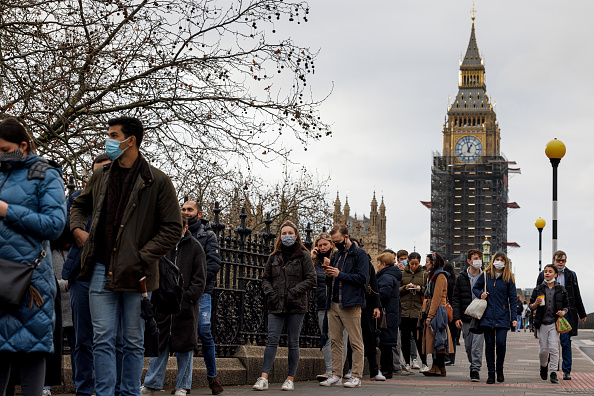‘Glimmer of Christmas hope’ as mild Omicron variant leads to less severely ill Covid patients, says relieved UK health chief

It seems increasingly the case that the Omicron variant may be less likely to result in serious illness than the Delta strain of coronavirus, thereby offering a “glimmer of Christmas hope”, according to UK Health Security Agency chief Jenny Harries yesterday morning.
Dr Harries told BBC Radio 4’s Today programme yesterday: “There is a glimmer of Christmas hope in the findings that we published yesterday, but it definitely isn’t yet at the point where we could downgrade that serious threat.”
The UKHSA estimates that someone with Omicron is between 31 per cent and 45 per cent less likely to attend A&E and 50 per cent to 70 per cent less likely to be admitted to hospital than an individual with the Delta variant.
The rapid spread of Omicron has seen it become the “dominant strain now right across the UK”.
Dr Harries added: “What we have got now is a really fine balance between something that looks like a lower risk of hospitalisation – which is great news – but equally a highly transmissible variant and one that we know evades some of our immune defences, so it is a very balanced position.”
Harries said key pieces of information about Omicron are still needed to understand how much of a risk it poses to the health service.
“We don’t yet know what the average length of stay for an individual is in a hospital,” Dr Harries told BBC Radio 4’s Today programme.
“We’re not seeing very significant rises in intensive care utilisation or in the use of ventilation beds.”
“Now that may be because a lot of the people who’ve been infected to date are actually younger people and we will see that coming through.”
But if the severity of the disease is actually “significantly lower than Delta” then some of the the impact on the NHS may be less severe, she said.
Mass staff shortages this Christmas
Nurses are in “despair” and facing a Christmas worse than last year amid mass staff shortages due to the Omicron wave, the head of the Royal College of Nursing has said.
RCN chief executive Pat Cullen described staff as “exhausted” as they routinely work 14-hour days with a depleted workforce.
Speaking to BBC Breakfast, she said: “Those staff that are isolating are actually quite sick, and the reason for that being their resources are so low, going off sick because of the shifts they’ve been working, some working 14-hour days.
“We talked to a nurse yesterday who described her colleagues and her staff as on the 13th day on a 12-hour shift.
“So if you get ill on the back of that, inevitably your own internal personal resources are pretty low.
“The despair that nurses are facing and the fear and the sheer struggle they’re facing every day will continue over the Christmas period, because this Christmas, of course, will not be normal. It will be similar to last year, if not worse, is what they’re telling us.”